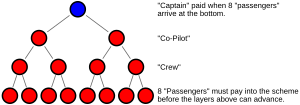Here's a revisit, on a different type of selective blindness, that the belief that as long as the product or service is legitimate, then the company itself must be legitimate. This is often used by affiliates of a company being suspected or accused of being a product-based pyramid scheme.
 |
| 8-ball pyramid scheme model. (Photo credit: Wikipedia) |
So what is a product-based pyramid scheme? A product-based pyramid scheme is a regular pyramid scheme that was disguised by purchases of products or services. However, to explain that, we have to discuss the definition of pyramid scheme, i.e. the Koscot Test.
Koscot Test was created when FTC sued Glenn W. Turner's "Koscot Interplanetary", an fancy named cosmetics company, and won, resulting in the "Koscot Test", which is described below:
- The participant makes a payment of money to the company;
- In exchange, the participant receives the right to sell a product (or service);
- In exchange, the participant receives compensation for recruiting others into the program;
- The compensation is unrelated to the sale of products (or services) to the ultimate user.
If a business fits all four parts of the test, then it is a pyramid scheme.
A year later, FTC sued Amway, who eventually convinced FTC that it does NOT fit test (4): that the compensation is directly related to sale of products (or services) to the ultimate user, and thus is it not a pyramid scheme. After asking for a few bits of reform, known as the Amway Safeguard Rules, FTC relented, thus establishing the difference between Multi-Level Marketing and Pyramid scheme (that one little difference on test 4).
So what does this have to do with Product-Based Pyramid? A product based pyramid mixes recruiting and purchase, by combining the two with "starter kit" (which all new members should/must purchase), and by fudging the definition of "ultimate user" through "self-consumption". Basically, if you join a product based pyramid scheme, you are requested to buy a large starter kit and monthly autoship (to yourself), and instead of selling the items (or service) to people who need them, you are requested to find MORE people like yourself... who also buy starter kits and subscribe to autoship. And you get paid when enough people like that have joined under you.
Test 4 is clearly meant to establish that there are actual sales to real retail customers, rather than the affiliates buying the stuff in hopes of qualifying oneself for commission. Thus, a large "starter kit" and attempting to formalize "self consumption" are clearly attempts to "end-run" the test 4, violating the spirit of the law if not the letter. This has the effect of creating something that ostensibly does NOT fit the 4-step test, yet is still effectively a pyramid scheme.
By asking the members to buy starter kits, and/or to subscribe to autoship, the shipments can be counted as "sales", esp. if sales to affiliates themselves are counted (i.e. "self-consumption"). One can ostensibly qualify for multi-level commission without having a single product sold via retail by merely recruiting a lot of self-consumers. Thus, members are expected to pay into the scheme (i.e. buy starter kit and subscribe to autoship), and get money out when s/he has sufficient downlines who also pay into the scheme (i.e. buy starter kit and subscribe to autoship). There's no doubt that this is a pyramid scheme, albeit products have taken place of money.
I am probably boring you with all these court cases, so here's my point I'm trying to make: the product itself is actually quite irrelevant. A company can have a proper product, (apparently) reward people for selling them, yet still operate as a pyramid scheme.
While most pyramid schemes are disguised with bogus products with minimal value, some suspected pyramid schemes, like Herbalife, essentially operates as a product-based pyramids scheme as described above. Herbalife has real products, not woo, and is apparently paying the people based on sales... but is it a product based pyramid scheme?
We'll discuss that next blog post.






I know this post is from many years ago, but this is excellent!
ReplyDelete